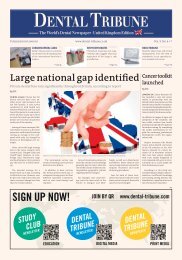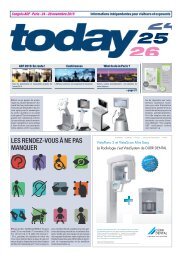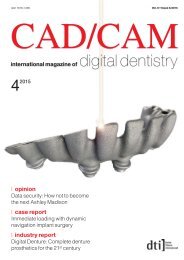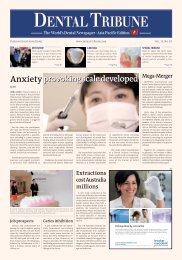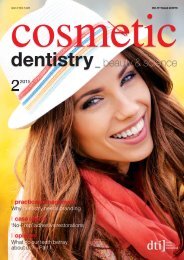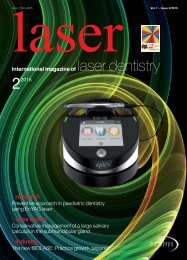today EOS Congress Venice 2015
From 13 to 18 June, the European Orthodontic Society is holding its annual congress in Venice. Dental Tribune International published a new issue of its today congress and trade show newspaper.
From 13 to 18 June, the European Orthodontic Society is holding its annual congress in Venice. Dental Tribune International published a new issue of its today congress and trade show newspaper.
You also want an ePaper? Increase the reach of your titles
YUMPU automatically turns print PDFs into web optimized ePapers that Google loves.
02 news<br />
<strong>EOS</strong> <strong>Venice</strong> <strong>2015</strong><br />
<strong>EOS</strong> congress <strong>2015</strong>:<br />
Driving orthodontic professionals to improve knowledge in their field<br />
An interview with Prof. Antonio Maria Miotti, chair of <strong>EOS</strong> <strong>Venice</strong> <strong>2015</strong><br />
For its 91 st annual congress, the<br />
European Orthodontic Society<br />
(<strong>EOS</strong>) returns to Italy for the<br />
sixth time. Prof. Miotti, why was<br />
<strong>Venice</strong> chosen as this year’s location,<br />
and what does this choice<br />
mean to you?<br />
<strong>Venice</strong> was chosen by my sister<br />
Francesca Ada Miotti, professor and<br />
head of the Department of Orthodontics<br />
at the University of Padua, when<br />
she was elected as president of the<br />
<strong>2015</strong> <strong>EOS</strong> congress. Unfortunately,<br />
she died in 2013 and I was then chosen<br />
to complete her work—although I<br />
am a maxillofacial surgeon—as I have<br />
been a member of the <strong>EOS</strong> for more<br />
than 30 years, with a major interest<br />
in the treatment of skeletally based<br />
malocclusions.<br />
The choice of <strong>Venice</strong> really means<br />
a great deal to me, apart from my being<br />
born in the Venetian region, first<br />
AD<br />
of all because it was my sister’s choice<br />
and the congress will be a tribute to<br />
her, but also because my father or -<br />
ganised a memorable <strong>EOS</strong> congress<br />
as president in <strong>Venice</strong> in 1992.<br />
The main objective of the <strong>EOS</strong><br />
is to advance all aspects of orthodontics<br />
and its relations with the<br />
col lateral arts and sciences for public<br />
benefit. How important is the<br />
annual congress in achieving this<br />
overall aim?<br />
The annual <strong>EOS</strong> congress is one<br />
of the main opportunities for or tho -<br />
dontists from all around the world to<br />
meet and discuss relevant themes,<br />
keep up to date, and get to know or<br />
become friends with colleagues from<br />
far-away countries. The benefit for<br />
the public is obvious, as orthodontic<br />
knowledge and new discoveries or<br />
results become widespread.<br />
What would you describe as the<br />
main focus of the 91 st congress, and<br />
what topics will be discussed?<br />
Main topics are early or late treatment<br />
in orthodontics; the question<br />
of whether there is still a need for<br />
extractions in orthodontics; scientifically<br />
based clinical decisions and justifications<br />
for orthodontic treatment;<br />
and integrated orthodontic care.<br />
“Orthodontics in Europe is a well-defined<br />
specialty of dental surgery.”<br />
The last two topics are really re -<br />
levant for public and community<br />
health care in any national or regional<br />
health system. The first one is<br />
particularly useful to decide what<br />
kind of treatment should be delivered<br />
and when, for example during<br />
growth or at the end of it. The second<br />
aims to define collaborative paths<br />
between different specialties, such<br />
as oral and maxillofacial surgery,<br />
paediatrics, ENT surgery, and so on.<br />
Aside from the scientific programme,<br />
what can participants<br />
look forward to in <strong>Venice</strong>?<br />
<strong>Venice</strong> does not need any intro -<br />
duction and it is one of the cities to visit<br />
in the world. The whole lagoon is full<br />
of art and history, and a few days will<br />
certainly not be enough, but could be<br />
a starting point for another visit.<br />
The social programme of the<br />
congress is very rich, starting with<br />
the opening reception at the grand<br />
Palazzo del Cinema, each year home<br />
to the annual <strong>Venice</strong> Film Festival,<br />
followed by a buffet supper around<br />
the exhibitors’ stands at the Palazzo<br />
del Casinò, built in the 1930s.<br />
There will also be the President’s<br />
Reception at the beautiful Hotel<br />
Excelsior with terraces overlooking<br />
the world-renowned Lido di Venezia<br />
beach. The impressive hotel was built<br />
in the early 1900s and appeared in<br />
famous films.<br />
The gala dinner will be held at<br />
the Scuola Grande di San Giovanni<br />
Evangelista, a wonderful palace built<br />
in the 13 th century containing precious<br />
paintings of Jacopo Palma il<br />
Giovane, Giovanni Battista Tiepolo<br />
and Jacopo Tintoretto.<br />
Could you please describe the<br />
current situation regarding ortho -<br />
dontics in Europe? Which factors<br />
have had the most influence over<br />
the past several years?<br />
Orthodontics in Europe is a welldefined<br />
specialty of dental surgery.<br />
In most countries, university postgraduate<br />
courses have been developed<br />
to improve professional knowledge,<br />
ranging from true speciali sa tion<br />
degrees to shorter master’s degrees.<br />
Also many national societies give<br />
their support in organising courses<br />
and national congresses.<br />
The development of new materials<br />
and technologies over the past<br />
several years has greatly improved<br />
and to some extent shortened orthodontic<br />
treatments. Equally important<br />
are studies on growth and tooth<br />
movement that are coming out with<br />
new findings. <strong>Congress</strong>es like <strong>EOS</strong><br />
<strong>2015</strong> in <strong>Venice</strong> are an effective way<br />
to focus and share knowledge in this<br />
field from all points of view, epidemiological,<br />
experimental, clinical, etc.<br />
One of the topics of the congress,<br />
scientifically based clinical decisions<br />
and justifications for orthodontic<br />
treatment, is a real key issue, as in<br />
any other dental or medical surgical<br />
subject nowadays. Its ethical and<br />
financial implications are evident.<br />
How does the <strong>EOS</strong> address these<br />
trends?<br />
The <strong>EOS</strong> is one of the oldest dental<br />
and medical associations, as it was<br />
founded back in 1907 and since then<br />
has always driven orthodontic professionals<br />
to improve knowledge in<br />
their field.<br />
The aim of the <strong>EOS</strong> is to advance<br />
all aspects of orthodontics for public<br />
benefit. Apart from organising a major<br />
congress each year in a different<br />
European nation, with up to 2,000 or<br />
more participants, the <strong>EOS</strong> organises<br />
courses and gives a range of im por -<br />
tant grants and awards, supporting<br />
research and fellowships to allow<br />
junior researchers to visit research<br />
departments. By doing this, the <strong>EOS</strong><br />
directly influences the deve lopment<br />
of orthodontics in Europe, if not all<br />
over the world.<br />
Thank you very much. <br />
Prof. Antonio Maria Miotti has a<br />
degree in medicine and surgery from<br />
the University of Padua in Italy and<br />
specialised in den tal surgery at the<br />
same university. He was trained in orthodontics<br />
at the University of London<br />
in the UK and the University of Turin in<br />
Italy. He has always been involved and<br />
committed to orthognathic surgery and<br />
also specialised in maxillofacial surgery<br />
at the University of Milan in Italy.<br />
For the last 23 years, Miotti has been<br />
head of the Department of Maxillofacial<br />
Surgery “Center for Diagnosis<br />
and Treatment of Skeletally Based<br />
Malocclusions” at the regional university<br />
hospital of Udine in Italy, and retained<br />
the position of Clinical Professor<br />
at the Department of Orthodontics of<br />
the University of Padua for more than<br />
20 years. He is also the author of more<br />
than 200 scientific papers and more<br />
than 300 contributions to national and<br />
international meetings.



